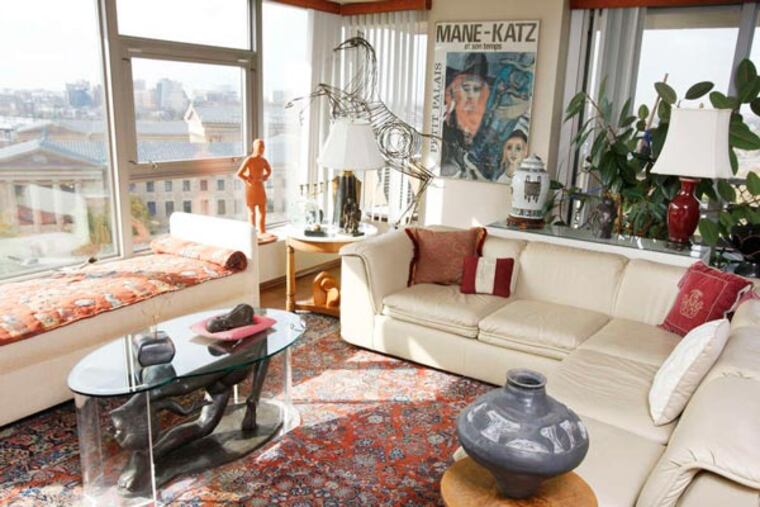Haven: Views of art, vistas of the city
A Center City condo is filled with pieces collected and pieces created by the owner.

Residents of the upper floors at the Philadelphian are accustomed to exclamations of "Wow!" from first-time visitors. The condominium building faces the Parkway and offers panoramas of Center City, the Art Museum, the Schuylkill and Boathouse Row.
In the condo of artist Bebe Weiss, however, the "wow" comes as soon as a visitor walks in, before those enviable vistas are even in sight. A red foyer provides a dramatic backdrop for her stunning bronze-toned sculptures and black-glazed ceramics.
More sculptures - a dancer, a mother with three children, a bust of a handsome man - are displayed on pedestals in the pale-beige living room.
Though the view of the Art Museum behind the sofa is striking, a guest may be sidetracked by an object in front of it: A nude female sculpture encased in acrylic and glass functions as a coffee table.
Large terra-cotta figures of a cowboy and a Native American represent her earliest work. Weiss never studied art growing up in South Philadelphia, but she began to take sculpture classes at Allens Lane Art Center while raising a family in Melrose Park.
Her favorite work, Sibling Rivalry, portrays a mother holding a baby while a little boy and girl tug at the folds of her dress.
"This was me," says Weiss, who has two sons and a daughter. The bust is of her husband, psychiatrist Laurence Weiss, who died in 2007.
The couple moved to the Philadelphian after it was converted from rental apartments to condominiums in the early 1980s.
"We needed three bedrooms because our children were still in college," she says. The condo was spacious enough to accommodate the antique furnishings from their Melrose Park home.
Walls in one guest bedroom are red, like the foyer. The master bedroom's walls are mottled green. Paint shades pick up colors in the Oriental rugs that cover parquet floors dating from 1962, when the Philadelphian was built.
A second guest bedroom doubles as a den. Its pale-blue walls were inspired by an abstract blue, red and white painting that was a gift from a Japanese exchange student the Weisses hosted.
The wrought-iron Yellin Metal Works chandelier in the dining room also hung in Melrose Park. The red silk rug beneath the walnut table was purchased by Weiss and her husband on a trip to China.
"It's indestructible," she says. "Spills just wipe up."
Though the kitchen was renovated 30 years ago, the white cabinets and gray tile backsplash "are still classic," Weiss says, and provide a foil for her fluted black ceramic bowls.
Weiss switched from figurative sculptures to ceramics after she moved to the Parkway. She studied with a teacher at the Philadelphian and later enrolled in classes at Community College of Philadelphia, where she continues to work in the studio and at the kiln twice a week.
"Ceramics are freer than sculpting," she says. "You don't have to worry about portraiture."
Her most recent piece - a totem pole of multicolored cylindrical forms - is decorative. "That's it!" Weiss says. "I have no more space. I'm just going to make things I can use."
Among the functional ceramics she's fashioned are a whimsical black teapot with white polka dots, three black tables in the den, and a white toilet paper holder and hamper in one of her 21/2 baths. The hamper's cutouts mimic the design of the wallpaper on the ceiling.
Weiss says her current project is a wine rack. She'll carry it home from the studio in a baby stroller once used by her grandchildren (she has eight, now ages 16 to 23).
For years, molding clay was a creative outlet for Weiss while she pursued a career - until her retirement in June, she was a rehabilitation specialist for the mentally ill. Displayed in the condo's foyer is a small guitar crafted by a patient from a cigar box, a bent fork, and other found objects.
Nearby hangs a painting of her former home in Melrose Park, a Tudor. The artist was her late father, Benjamin Magness, who earned a living as a specialty house painter, producing grained wood and such.
Weiss, who has exhibited at the Woodmere Art Museum and the Indianapolis Art Museum, and at shows at the Philadelphian, denies she has her father's talent.
"I can't draw," she insists. "I can push clay into place, but I can't visualize anything on a flat surface. It has to be three-dimensional."